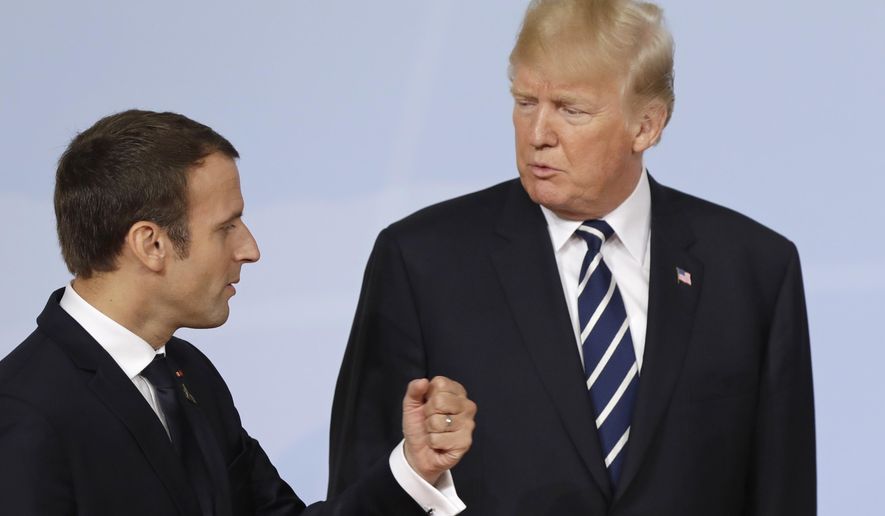The governors of more than a dozen liberal states, described as the economic equivalent of “the third-largest country in the world,” said Wednesday they are on track to meet their share of the Paris climate agreement despite President Trump’s decision to withdraw.
Known as the U.S. Climate Alliance, the 14 governors released a report showing that their states will be able to reduce emissions by 24 percent to 29 percent below 2005 levels by 2025, which would “fulfill their contribution to the Paris Agreement targets.”
“We’re doing something in the face of inaction, or as Gov. [Andrew] Cuomo said, denial,” said Gov. Jerry Brown, California Democrat, at a press conference in New York City.
Even without Paris, the U.S. has led the world in reducing carbon dioxide emissions, thanks in large part to the transition from coal to natural gas, made possible by technological breakthroughs such as hydraulic fracturing.
The governors didn’t mention fracking, which Mr. Cuomo has banned in New York, crediting the anticipated decline instead to clean-energy initiatives such as cap-and-trade programs and incentives to buy electric cars and solar panels.
“We are controlling our own destiny, and there is nothing that Donald Trump can do to stop us in our states from advancing these policies,” said Gov. Jay Inslee of Washington. “He can’t stop our caps. He can’t stop our cap and trades. He can’t stop our incentives.”
The governors launched the alliance June 1, the same day Mr. Trump announced he would pull out of the nonbinding accord, saying it would place the U.S. economy at a huge disadvantage in order to achieve a negligible reduction in global temperatures.
The alliance grew this week to 14 states — Puerto Rico is also a member — with the addition of Democratic Gov. Roy Cooper of North Carolina.
The alliance has been billed as bipartisan, which is technically true, albeit just barely. The only GOP governor on the list is Charlie Baker of Massachusetts, recently described by The Atlantic as “the bluest Republican.”
Combined, the 14 states represent 41 percent of the U.S. gross domestic product, which would make them the third-largest economy in the world if they broke off and formed a separate nation — which the Democrats were quick to insist they aren’t planning to do.
“If we were a country — and we’re not suggesting that, because there would be a constitutional problem — but if we were a country, we would be the third-largest economy of any nation in the world,” Mr. Inslee said. “So this is a significant achievement.”
Added Mr. Brown: “The number of states represent in economic terms the third-largest entity in the world if we were to be one nation-state — which we of course are not.
“But together, in aggregate, we are a political and economic force, and we will drive the change that will get us to the climate goals that we have to reach,” Mr. Brown said.
The report issued Wednesday found that the 14 states had reduced emissions by 15 percent between 2005 and 2015, as opposed to a 10 percent decrease by other states well before enacting any policies tied to the Paris agreement.
Credit was given to the alliance states’ growing renewable energy portfolio, zero-emission vehicle fleet and energy efficiency initiatives, such as LEED-certified “green buildings.”
Included in the 2015 Paris accord was a hefty financial commitment: Developed countries pledged to transfer a combined $100 billion to developing nations to help them comply with the agreement, which seeks to hold increases in global temperatures to below 2 degrees Celsius.
Will the 14 states pay the U.S. share? Former Secretary of State John F. Kerry said at the press conference that he had met with several financial leaders, including ex-New York City Mayor Michael Bloomberg and World Bank President Jim Yong Kim, to discuss private sector funding.
Mr. Brown pointed to the cap-and-trade agreement between California and Quebec, which he said could result in “billions of dollars of private money that could go in part to supporting Third World countries to the extent they could reduce their greenhouse gases.”
Mr. Trump has said that he would reconsider withdrawing from the climate agreement if the conditions are renegotiated, which, so far, European leaders have said they refuse to do.
The announcement received a shoutout from actor Leonardo DiCaprio on Twitter.
Mr. Cuomo urged other governors to join the alliance, saying they should “take a hard look at the facts and the science and put aside the politics.”
“The coalition and the alliance and the sharing of information and the sharing of technology, I think, is a beautiful [counterexample] to the denial of the federal government,” Mr. Cuomo said, “and that’s what this alliance is about.”
• Valerie Richardson can be reached at vrichardson@washingtontimes.com.




Please read our comment policy before commenting.